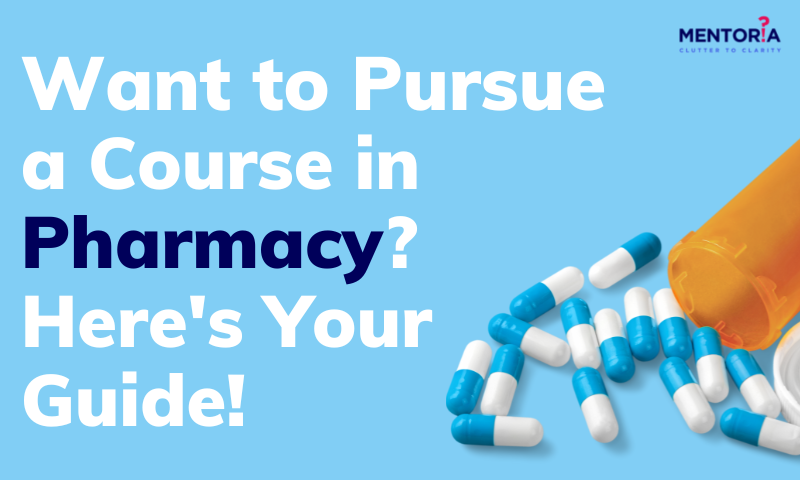Want to Pursue a Course in Pharmacy? Here’s Your Guide!

The discipline of pharmacy may appeal to you if you enjoy the combination of science, technology, healthcare, research, and computer technology. The field of pharmacy is flexible and dynamic in nature.
Most people think that pharmacists can only work in pharmacies, medical supply stores, and dispensaries. However, this is not true.
A job as a pharmacist teaches individuals how to produce medicines and recommends dosages that patients should take to recover from their illnesses or keep themselves healthy. A job in this field provides high earning potential, outstanding benefits, flexibility, and room for advancement.
Who is a Pharmacist?
Pharmacists are healthcare specialists tasked with ensuring that patients receive the most therapeutic benefit possible from their medical treatment. The role of a pharmacist is not restricted to merely buying and selling of medicines.
In addition to detecting injuries and illnesses across different cultures and nations, they are involved in clinical and medicinal research. A pharmacist should be detail-oriented, have a knack for science, and be a good learner.
What are the Educational Qualifications Required?
Take the Science Stream in your 10+2 education. You can take any combination of subjects –
- Physics Chemistry Biology (PCB)
- Physics Chemistry Mathematics
- (PCM) or Physics Chemistry Biology Mathematics (PCBM)
What are the Different Courses in Pharmacy?
Pursue Undergraduate Education
After completing your 10+2 in the science stream, you can enrol in any of the courses below. The course length, syllabus, opportunities, and degree of these courses vary.
Diploma in Pharmacy
If you want to open your own pharmacy and practise pharmacy in India, you must at least obtain a diploma in pharmacy, a two-year programme that requires at least a 10+2 in science as a prerequisite. Also, students pursuing a diploma can get lateral entry to 2nd year in Bachelor’s of Pharmacy on the basis of merit.
Bachelor’s Degree in Pharmacy (B.Pharm)
If you want to work in the pharmaceutical industry, such as Sun Pharmaceutical, Lupin Ltd, Dr. Reddy’s Laboratories, etc., you must have a bachelor’s degree in pharmacy. The bachelor’s degree course structure combines classroom training with real-world experience in the pharmaceutical sector.
Doctor of Pharmacy (Pharm.D)
One can also go for a six-year programme called the Doctor of Pharmacy (Pharm. D). Following 10+2, this six-year programme consists of five years of clinical and community-based theoretical study, ward rounds, and an internship in a hospital for one year. Students pursuing a B.Pharm degree may apply for lateral entry on a merit basis directly into the fourth year of a Pharm.D. programme.
Pursue Postgraduate Education
Any of the courses listed below can be chosen as a post-graduate option. Both of them will help you specialise and gain understanding in one or two subjects. The curriculum, available research options, and degree of these courses vary.
Master’s Degree in Pharmacy (M.Pharm)
A candidate who has earned their pharmacy bachelor’s degree is qualified to pursue a master’s degree in the field. An individual with a Master’s in Pharmacy degree has an advantage over pharmacy graduates in Research and Development. A few scholarships and other forms of financial aid are also provided in this industry. Also, one needs to select one out of the ten specialisations to pursue their master’s education in.
Doctor of Pharmacy (Post-Baccalaureate)
This programme works as a bridge between traditional B.Pharm and standard Pharm.D by advancing professional abilities and career options in clinical and research settings. The duration of the programme is 2 years plus 1 year of internship. The minimum eligibility to pursue Doctor of Pharmacy (Post-Baccalaureate) is B.Pharm from an approved institution.
Where to Study?
- Jamia Hamdard University (Delhi)
- Bundelkhand University (Jhansi, Uttar Pradesh)
- Delhi Institute of Pharmaceutical Sciences & Research (Delhi)
- Mahatma Jyotiba Phule Rohilkhand University (Uttar Pradesh)
- MET Institute of Pharmacy (Mumbai)
- Manipal College of Pharmaceutical Sciences (Manipal)
- University Institute of Pharmaceutical Sciences (Chandigarh)
- Bombay College of Pharmacy (Mumbai)
What are the Different Career Options?
There is a never-ending demand for pharmacy professionals. They are employed by neighbourhood pharmacies, clinics, nursing homes, mail-order pharmacies, hospitals, managed care organisations, and governmental organisations.
Some of the career options are as follows:
- Researcher
- Pharmaceutical marketing and sales rep
- Drug Inspector
- Assistant Drug Controller
- Deputy Drug Controller
- Drug Safety Associate
- Clinical Research Associate
- Pharmaceutical Scientist
What is the Salary?
A pharmacist is a well-known profession among science students. A Pharmacist earns an average salary of around INR 8-10 Lacs annually, depending on the job experience.
The remuneration varies depending on the field of work chosen, geographical location, work responsibility, skills, and experience.
Mentoria is Here to Help You Establish a Career in Pharmacy!
We’re here to provide you with all the help! Kick-start your career discovery journey with Mentoria and discover the right career fit for you. Feel free to call us to speak to our career mentors and choose the right career guidance plan that suits your needs.
Mentoria’s career guidance programme enables you to choose your perfect fit from 3 streams, 850+ courses, and 12,000+ careers, and discover what will bring out the best in you.






